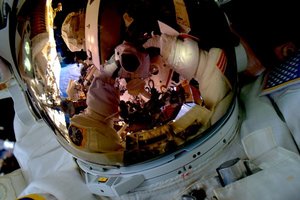 Kenison Garratt Editor-in-Chief and A&E Editor Astronaut Scott Kelly has returned from space, and the National Aeronautics and Space Administration (NASA) has announced he plans to retire April 1. The 52 year-old spent nearly a year at the International Space Station (ISS), which is about five thousand trips around the Earth or some 143,846,525 miles. Kelly’s mission was to renovate the ISS while participating in experiments to test the prolonged effects of microgravity on the human body and how the impacts may be counteracted. The astronaut returned to the surface March 1, and while he plans to retire, he will continue to aid other scientists in research by providing periodic samples and being present for occasional testing. “My career with the Navy and NASA gave me an incredible chance to showcase public service to which I am dedicated, and what we can accomplish on the big challenges of our day,” says Kelly. “I am humbled and excited by new opportunities for me to support and share the amazing work NASA is doing to help us travel farther into the solar system and work with the next generation of science and technology leaders.” His landing in Kazakhstan with his mission partner Mikhail Kornienko went smoothly. However, the adjustment to Earth can be rather difficult. The usual stay in space is six months, and after 340 days, Kelly is having some problems with his clothing. In space, the clothes floated around his body and did not meet his skin. “It’s very, very sensitive,” says Kelly. “It’s almost like a burning feeling wherever I like sit or lie or walk.” While getting comfortable with his life on Earth again is a challenge, Kelly seems to be enjoying himself. He has been sharing his experiences now that he is back home with his 1.03 million followers through his Twitter account, @StationCDRKelly.
NASA administrator Charles Bolden has detailed on how appreciative the space agency is of Kelly for making so many contributions and for giving up “time with his loved ones, meals that don’t come in a bag, a cold beer, hot showers, cool autumn breezes, the sounds of birds chirping, the ability to lay his head on an actual pillow, and so much more of the pleasures of life.” While most of his journey was work, the astronaut did have time for some play. Kelly has posted over one thousand images to Twitter and Instagram of his time in space and even a video where he chased his crew mates around the space station while wearing a gorilla suit. “His passion for this work has helped give hundreds of thousands of people a better understanding of what NASA does, thanks in part to the numerous photos and updates he shared from space,” says Brian Kelly, director of Flight Operations at NASA’s Johnson Space Center in Houston. “We appreciate his years of service and anticipate many benefits to come from them, thanks to the research he’s supporting.” The giver of the gag gift, Mark Kelly, is actually Kelly’s twin brother, who is a retired astronaut himself. Kelly’s results will be compared to his brother, who has remained on Earth. Researchers will be looking for genetic changes that were consequences of high radiation and the weightlessness environment of space. “Scott’s contributions to NASA are too many to name,” adds Brian Kelly. “In his year aboard the space station, he took part in experiments that will have far-reaching effects, helping us pave the way to putting humans on Mars and benefiting life on Earth.” Kelly’s feats have been truly incredible ones. Besides the research he will continue to contribute to in the future, he now holds the U.S.-record for most time spent in orbit and the record for most time in space, having been on four different missions and spent 520 days off of Earth. The previous record, set by Michael Lopez-Alegria in 2007, was 215 days. Now, Kelly is ranked as the seventeenth most experienced astronaut in the world, and behind him at spot eighteen is Kornienko, with a total of 516 days over two flights aboard the ISS. But Kelly is just excited for what is to come and for what his trip means for space exploration and for science. “Records are meant to be broken,” says Kelly. “I am looking forward to when these records in space are surpassed.” Comments are closed.
|
Archives
March 2017
Categories
All
|

